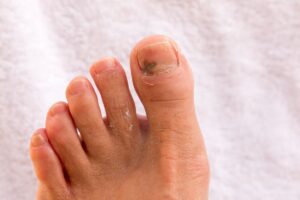
KeryFlex Nail Systems Helps Cure Onychomycosis – Possible agents are dermatophytes, mold, fungi, or yeast. A KOH scraping, fungal culture, and or PAS stain may assist in the diagnosis. The clinical evidence of a fungal infection depends on the type of pathogenic agent and the primary area of the infection of the nail, the infection period and the condition of the immune system of the patient. A KOH scraping, fungal culture, and/or PAS stain will aid in diagnosis.
One study has determined patients’ perception of the effect of onychomycosis on their quality of life. A total of 258 subjects were interviewed by questionnaire: 118 (46%) from Massachusetts General Hospital, 99 (38%) from Columbia University College of Physicians and Surgeons, and 41 (16%) from the University of Texas Medical Branch at Galveston. The subjects, who had volunteered for clinical trials on onychomycosis, were generally healthy, had a median age of 51.5 years, and were predominantly white and male.
The mean duration of nail fungal disease in the study population was 9.5 years. At the time of the interview, 227 subjects (88%) had active nail disease. More than half with fingernail disease and about 35% of those with toenail disease had disease. More than half with fingernail disease and about 35% of those with toenail disease had had involvement of one to three nails. All 10 digits had been affected in 15% of subjects with fingernail and 28% of those with toenail involvement.
Nearly 40% reported an associated fungal infection on the soles during the past 3 years. Onychomycosis affected the fingernails alone in 23 subjects (9%), the toenails alone in 128 (50%), and both the fingernails and toenails in 107 (41%). The group with toenail involvement alone included a significantly higher proportion of men (63% vs 43%), white subjects (88% vs 74%), and subjects employed in white collar or professional positions (61% vs 39%) than the group with fingernail involvement alone. 70% of subjects considered their nails to be at least a moderate problem. Subjects with toenail involvement alone perceived their problem as more serious, with 19% categorizing it as severe or very severe as compared with 30% with fingernail involvement alone and 46% with both toenail and fingernail involvement. This difference was also significant.
![]()